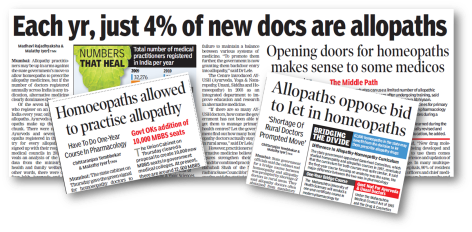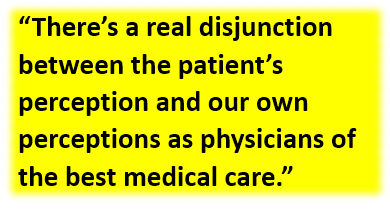Recently, the government of Maharashtra decided to allow doctors practicing homeopathy to prescribe allopathic medicines, provided they completed a one-year bridge course in pharmacology. Allopathy practitioners (the conventional or mainstream doctors) are not happy with this.
Going by the numbers registered in 2011, for every allopath, there are 13 Ayurveds (practicing Ayurveda) and 7 homeopaths. There is an acute shortage of doctors, more so in the rural areas. The government thinks the decision will help to improve the situation.
The decision has set off a debate. Expect protests on the streets and cases in the courts.
I am fortunate to have good friends practicing different systems of medicine. A homeopath has been taking very good care of me and my family for more than two decades. I went against his advice three years ago, when an excellent neurosurgeon (who did not bother to hide his scorn for “alternative” medicine) opened up my head and got rid of my trigeminal neuralgia. A young Ayurveda practitioner literally straightened out by wife’s back problem.
On the other hand, I have heard some horror stories and been through my share of them. Of homeopaths slipping in steroids to speed up the cure. Of a respected surgeon threatening a gullible family of dire consequences if they dared to opt for palliative care and stopped the never-ending chemo and radiation cycles. Of a senior doctor from a reputed house of Ayurveda plying a seriously ill patient of diabetes with one bitter medicine after another, ignoring the sugar levels, until the patient slipped into a coma.
No, I am not here to take sides. To me the practitioner matters more than the -pathy.
I am a part of the silent, suffering majority. Our knowledge of anatomy and physiology is just enough to describe our sundry aches and pains. Our understanding of pharmacology is limited to the names of the medicines we take day after day.
I have an appeal to all doctors, regardless of -pathy.
Dear doctor, when I come to you, I am confident you will do what is best for me. I do not expect you to be an expert in all systems of medicine. Yet, is it too much to expect an open mind? When the placebo effect is real and a puzzle, why dismiss every other genuine – pathy as humbug?
I respect the huge books you have mastered and the years you have put in. The depth of your knowledge of even the tiniest part of the body is amazing. But I am more than the sum of my parts. Can you please spare some time to listen, to understand? Sometimes all that I need is your shoulder, not your prescription.
Whether it is a test, a course of medicine or a procedure, your prescription is my command, my lifeline. Please let compassionate pragmatism rule your advice than the value of my medical insurance policy.
When one member is very ill, I know how troublesome it is for you handle the rest of the family. Please be patient with us. When we have entrusted you with the care of a dear life, we will listen to you. Please spare the time and the trouble to talk to us, preferably in a language we can understand.
None of us likes to die or even talk about death. But we expect you to tell us the truth, however bitter. I would rather live than be kept alive. No, I will not curse your incompetence. I will not blame you for abandoning me. I will thank you for helping me move on in peace. I will thank you for saving my family from utter ruin—physically, emotionally and financially.
The dictionary gives the meaning of -pathy as “disease” (psychopathy, neuropathy), as “method of treating disease” (allopathy, homeopathy), and, most importantly, as “feeling” (empathy, sympathy).
Once we are through with the altercation, the agitation and the litigation, how about a bridge course for all doctors? We do not need the government for this. We do not need textbooks. I am sure there are enough doctors among us who can teach the rest, regardless of – pathy.
Dear doctors, how about a bridge course in empathy and sympathy?


